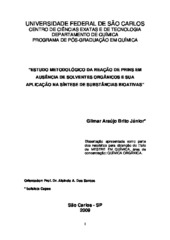| dc.contributor.author | Brito Júnior, Gilmar Araújo | |
| dc.date.accessioned | 2016-06-02T20:36:24Z | |
| dc.date.available | 2010-01-15 | |
| dc.date.available | 2016-06-02T20:36:24Z | |
| dc.date.issued | 2009-07-31 | |
| dc.identifier.citation | BRITO JÚNIOR, Gilmar Araújo. Methodological study of the Prins reaction in absence of organic solvents and their application in the synthesis of bioactive substances. 2009. 249 f. Dissertação (Mestrado em Ciências Exatas e da Terra) - Universidade Federal de São Carlos, São Carlos, 2009. | por |
| dc.identifier.uri | https://repositorio.ufscar.br/handle/ufscar/6457 | |
| dc.description.abstract | In this work it was done a methodological study on Prins cyclization reaction in the absence of organic solvents. The synthesis of target compounds was possible by using or the catalytic system pTSA.SiO2(gel) initially developed in this project, as shown in Figure I. As a initial proposal of this work, another catalytics systems were developed, this time using non-protonic Lewis acids. The catalytic system FeCl3.SiO2(aerosil) was shown to be the most advantageous among other catalytic systems developed in parallel experiments. The synthesis of target compounds FLOROL ® (6) and CLARYCET ® (8), in absence of organic solvents, was possible by using this catalytic system. The same catalytic system was employed to the preparation of the skeleton of the compound (+/-)- Diospongin A (Figure II). The developed catalytics systems showed to be effective on the catalysis of Prins cyclization reactions involving oxigenate compounds. But these systems had failed when homoallylics amines were employed and so it XII was not possible to obtain the compounds SS20846 A and pipecolic acid, as shown in Figure III. | eng |
| dc.description.sponsorship | Financiadora de Estudos e Projetos | |
| dc.format | application/pdf | por |
| dc.language | por | por |
| dc.publisher | Universidade Federal de São Carlos | por |
| dc.rights | Acesso Aberto | por |
| dc.subject | Química | por |
| dc.subject | Osteoporose | por |
| dc.subject | Diospongina A | por |
| dc.title | Estudo metodológico da reação de Prins em ausência de
solventes orgânicos e sua aplicação na síntese de substâncias bioativas | por |
| dc.title.alternative | Methodological study of the Prins reaction in absence of organic solvents and their application in the synthesis of bioactive substances | eng |
| dc.type | Dissertação | por |
| dc.contributor.advisor1 | Santos, Alcindo Aparecido dos | |
| dc.contributor.advisor1Lattes | http://lattes.cnpq.br/9005233120921421 | por |
| dc.description.resumo | Neste trabalho foi feito um estudo metodológico visando à reação de Ciclização de Prins em condições de ausência de solventes orgânicos. Com o sistema catalítico desenvolvido inicialmente (pTSA.SiO2(gel)), foi possível a preparação dos compostos de interesse industrial Florol® e Clarycet®, como mostrado na Figura I. Como proposta inicial do trabalho, outro sistema catalítico foi desenvolvido, desta vez utilizando ácidos de Lewis não protônicos. O sistema catalítico FeCl3.SiO2(aerosil) foi o que mais apresentou vantagens e desta vez, dentre outras substâncias, foi possível novamente a preparação dos compostos de interesse Florol® (6) e Clarycet® (8), em condições de ausência de solventes orgânicos. O mesmo sistema catalítico foi empregado visando a preparação do esqueleto do composto (+/-)-Diospongina A (Figura II) Os sistemas catalíticos desenvolvidos mostraram bons resultados frente à ciclização de Prins com compostos oxigenados. Porém esse sistema falhou frente à mesma reação com aminas homoalílicas, não sendo possível obter os compostos alvos SS20846 A e ácido pipecólico (Figura III) | por |
| dc.publisher.country | BR | por |
| dc.publisher.initials | UFSCar | por |
| dc.publisher.program | Programa de Pós-Graduação em Química - PPGQ | por |
| dc.subject.cnpq | CIENCIAS EXATAS E DA TERRA::QUIMICA | por |
| dc.contributor.authorlattes | http://lattes.cnpq.br/8904412440244044 | por |
